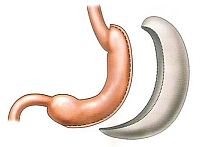Laparoscopic sleeve resection
The surgery takes place in an operating theatre under full anaesthesia and its duration ranges from 1 to 2 hours. Subject to precisely defined standardised conditions, the abdominal cavity will be filled with carbon dioxide that will make it possible to insert an endoscopy camera through the abdominal wall including several special long surgery instruments to be used to release the left-hand margin of the abdomen. This margin will be then cut away by a stapler along its entire length and it will get sutured with titanium clips in a way to form up a size-reduced sleeve-like and newly adapted stomach of a lower volume. Any fixing materials brought into your body during the surgery will be left inside your body for life. As a rule, we leave an abdominal drain in the body for two or three days after the surgery.
What happens after the surgery?
One day after the surgery, the patient can sit up, get up and walk around the bed with help of others. Only a limited quantity of liquids (no food) can be received. Normally, the entire duration of the hospitalisation does not exceed four days. Post-surgery pains are usually insignificant and, as a matter of course, they get suppressed so that the patient may feel no pain at all.
What complications may be faced?
There is almost no occurrence of complications associated with the laparoscopy sleeve resection of abdomen, however, as in case of any surgery, they may occur. They may include abdominal wall bleeding, infiltration of a trace quantity of gastric juice due to incomplete tightness of the sutured stomach wall, injury of internal cavity organs, infection, impaired lesion healing, vein thrombosis and pulmonary embolism, allergic reaction or any other complication during the operation as subject to complete anaesthesia. Attaching his/her signature to this informed consent, the patient agrees with possible replacement of the laparoscopy surgery for a classic open surgery or possible relocation to a specialised hospital or, as the case may be, to the administration of blood or plasma transfusion, if necessary.
Can the risk of complications be mitigated?
A number of examinations will be executed in advance in order to provide for a complication-free surgery and recovery. Antibiotics, stress ulcers inhibiting drugs, pain suppressing analgetic drugs and thrombosis and embolism preventing heparin are administered during the hospitalisation. A statistically significantly lower occurrence of complications and shorter post-surgery recovery time was observed in patients who reduced their weight prior to the surgery. Therefore, we recommend to all patients to reduce their weight by at least 5 kgs prior to the surgery respectively to adhere to a strict low-fat content diet up to 4 000 KJ for 2 to 3 weeks before the surgery and such a diet should include an increased share of proteins up to 40-50% and a significantly reduced share of saccharides to 30% from the current 50-60%. Skipping saccharides, stock nutrition may be taken from the liver reducing so in particular the left-hand lobe making the surgeon´s access to the stomach much easier. In order to avoid loss of muscular mass, the diet has to be rich in proteins. The receipt of liquids, minerals and vitamins must not be reduced. This is a specific method for the patient to contribute to a safe execution of the bariatric surgery.
What happens further after the surgery?
The patient checks out from the hospital (four days after the surgery, as a rule) and he/she is given a recommended diet scheme including liquid food in small portions approximately five times a day. Patients suffering from diabetes who were administered drugs against high sugar levels in blood usually show glycaemia levels dropping to the standard level and, therefore, they have to consult their further treatment with their diabetes specialist. The insulin-based diabetes treatment also requires a modification of doses after the stomach resection. High blood pressure does not normally require an immediate modification of the treatment after the bariatric surgery. In two weeks after the stomach resection, your general practitioner, diabetes specialist and internist specialised in obesity treatment should be informed on your health condition. The sutures will be removed in 7 to 14 days after the surgery. The patient should undergo general examination visits after every 3 months in the first year and after every 6 months in the following years. Every patient will receive a multi-language card explaining the surgery for the event of any acute problems and complications
If you have any further questions, please don´t hesitate to contact us.
To know if you are a suitable candidate for this procedure, please fill in the medical questionnaire. After having information about you we will be able to offer the best procedure, the best price and the operation date for you. Thank you for your cooperation.


